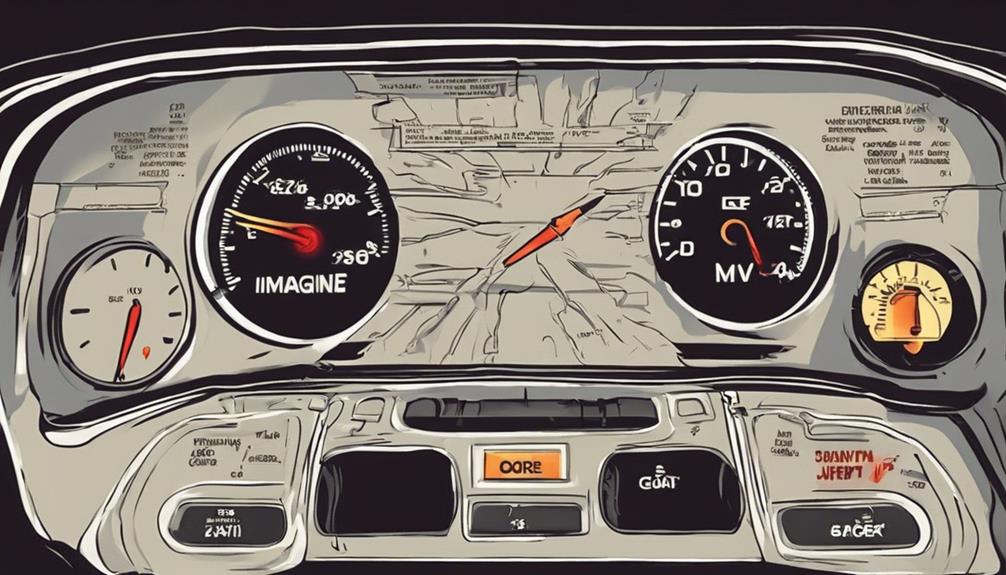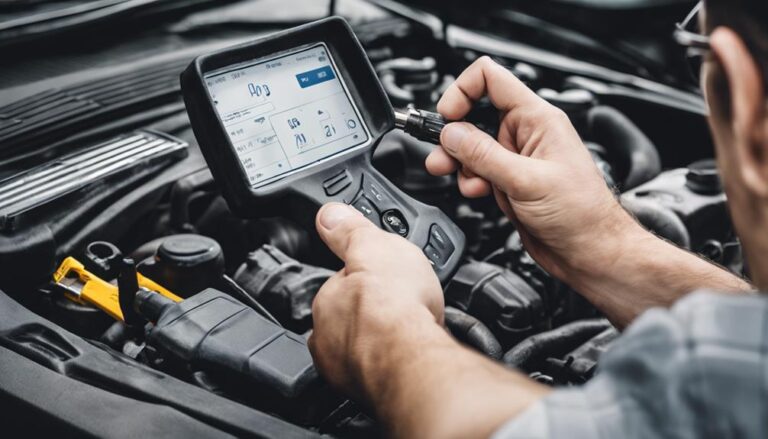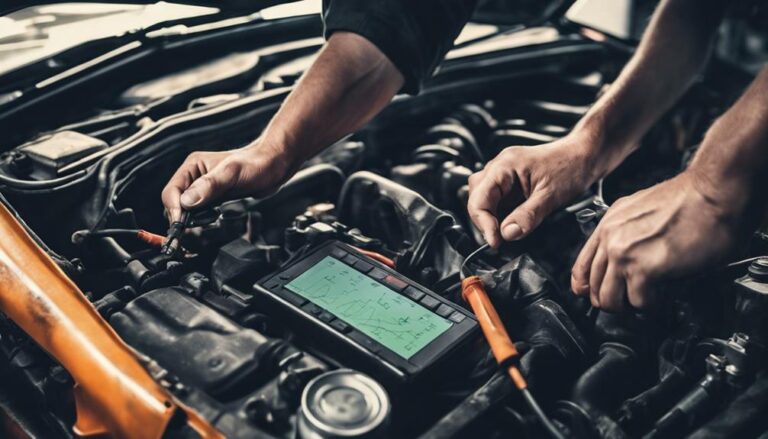10 Best Reasons for Blinking Check Engine Light
Have you ever experienced the sinking feeling of seeing your check engine light blink like a distant lighthouse in a storm? Each flicker signaling a potential hazard lurking beneath the surface of your vehicle's engine.
But fear not, for understanding the ten best reasons for this ominous warning can shed light on what lies ahead. From engine misfires to catalytic converter issues, each blink unveils a different puzzle piece to the overall health of your car.
So, buckle up and prepare to unravel the mysteries behind that blinking check engine light.
Key Takeaways
- Ignition system malfunctions can cause a blinking check engine light, indicating critical issues.
- Transmission problems like low fluid levels can trigger the check engine light and require immediate attention.
- Engine maintenance, including regular checks and proper oil levels, is crucial to prevent costly repairs.
- Fuel system issues, such as fuel injector or pump problems, can lead to a blinking check engine light and breakdowns.
Engine Misfire
Why does an engine misfire trigger a blinking check engine light?
An engine misfire occurs when the air-fuel mixture in a cylinder fails to ignite at the proper time due to issues with spark timing or fuel delivery. This disruption leads to a loss of power and can cause the engine to shake or run rough.
When the engine control unit detects a misfire, it interprets this as a critical issue that can potentially harm the catalytic converter and other engine components, prompting the illumination of the check engine light.
Common culprits behind misfires include worn spark plugs, faulty ignition coils, clogged fuel injectors, or imbalances in the air-to-fuel ratio. Ignoring these misfires can result in poor acceleration, decreased fuel efficiency, and long-term engine damage.
Therefore, addressing misfires promptly by diagnosing and resolving issues related to spark timing and fuel mixture is crucial to maintaining optimal engine performance and preventing costly repairs down the line.
Catalytic Converter Issue
If your check engine light is blinking, a potential catalytic converter issue might be causing an emissions system malfunction. This can lead to reduced engine performance and increased emissions output.
Ignoring this warning may result in higher repair costs and harm to your vehicle's efficiency and the environment.
Emission System Malfunction
Experiencing a blinking check engine light may point to a catalytic converter issue, impacting both emissions control and engine performance. When facing an emission system malfunction related to the catalytic converter, consider the following:
- Increased Emissions: A faulty catalytic converter can lead to higher emissions, harming the environment and potentially causing health concerns.
- Failing Emissions Tests: Issues with the converter can result in failing emissions tests, leading to legal repercussions and inconvenience.
- Reduced Fuel Efficiency: Catalytic converter problems can decrease fuel efficiency, costing you more money at the pump.
- Costly Repairs: Ignoring catalytic converter issues can escalate to engine damage, resulting in significant repair expenses.
Addressing catalytic converter problems promptly is crucial for maintaining a properly functioning vehicle and meeting emission standards.
Engine Performance Affected
Facing a catalytic converter issue affecting engine performance due to a blinking check engine light demands immediate attention to prevent further damage and ensure optimal vehicle operation.
The catalytic converter, vital for reducing harmful emissions in the exhaust system, can significantly impact fuel efficiency and overall engine functionality when malfunctioning. Neglecting these concerns may lead to decreased engine efficiency and increased emissions, ultimately affecting the vehicle's performance.
Addressing catalytic converter problems promptly is crucial to prevent costly repairs and maintain peak engine performance. By heeding the warning of a blinking check engine light signaling potential catalytic converter issues, you can safeguard your vehicle's health and efficiency while avoiding more extensive damage to the exhaust system.
Low Engine Oil Level
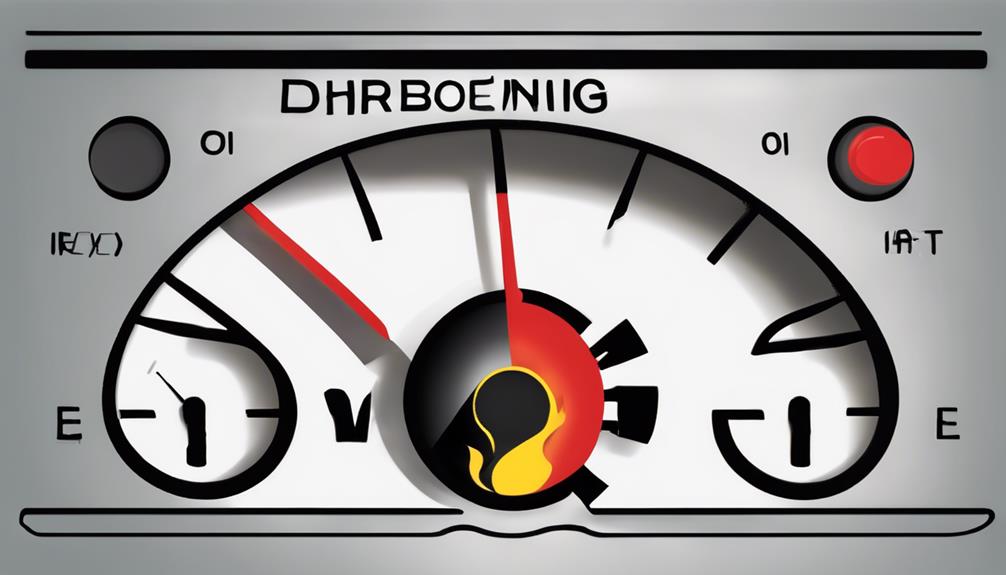
Maintaining adequate engine oil levels is essential to prevent triggering a blinking check engine light due to insufficient lubrication for engine components. Neglecting oil levels can have severe consequences, including increased friction, overheating, and potential engine damage. Here are four reasons why maintaining proper oil levels is crucial:
- Preventive Measures: Regularly checking and topping up oil levels can prevent the onset of a blinking check engine light, ensuring smooth engine operation.
- Engine Protection: Low oil levels can lead to decreased engine performance, reduced fuel efficiency, and increased wear on internal parts, affecting the overall health of your vehicle.
- Costly Repairs: Ignoring a blinking check engine light caused by low oil levels may result in costly repairs and even engine failure, emphasizing the importance of timely oil checks.
- Sustained Performance: Adequate oil levels ensure optimal lubrication, enabling your engine to operate efficiently, maintain performance, and extend its lifespan.
Faulty Oxygen Sensor
If your oxygen sensor is faulty, it can cause your check engine light to blink, indicating incorrect oxygen levels in the exhaust system.
This can result in decreased fuel efficiency, increased emissions, and overall engine performance issues.
To address this, it's essential to understand the impact of the oxygen sensor, recognize common symptoms, and know the steps for repair and replacement.
Impact of Oxygen Sensor
A faulty oxygen sensor significantly impacts fuel efficiency and emissions levels in a vehicle. When the oxygen sensor malfunctions, it disrupts the air-fuel ratio, leading to poor combustion efficiency and increased emissions.
Here are four key impacts of a faulty oxygen sensor that you should consider:
- Decreased Performance: Your vehicle may experience reduced power and overall performance due to improper fuel mixture caused by a faulty oxygen sensor.
- Increased Pollution: Higher emissions result from an unbalanced air-fuel ratio, contributing to environmental pollution.
- Potential Damage: Ignoring the faulty oxygen sensor can lead to catalytic converter damage over time, resulting in costly repairs.
- Check Engine Light: A malfunctioning oxygen sensor can trigger the check engine light to blink, indicating a problem that needs attention.
Common Symptoms
Experiencing irregular engine performance could signal a potential issue with your vehicle's oxygen sensor. A faulty oxygen sensor can lead to poor fuel economy, rough idling, and increased emissions. Ignoring these symptoms may result in decreased engine performance and potential catalytic converter damage. Oxygen sensors are vital for monitoring and adjusting the air-fuel mixture to optimize engine performance and emissions control. To address these issues, prompt replacement of a faulty oxygen sensor is crucial to maintain proper engine function, emission compliance, and fuel efficiency.
| Common Symptoms of Faulty Oxygen Sensor | |
|---|---|
| Poor Fuel Economy | Rough Idling |
| Increased Emissions | Decreased Engine Power |
Repair and Replacement
When addressing a faulty oxygen sensor, timely repair or replacement is crucial to prevent further damage to your vehicle's emissions system. Here are four essential steps to consider:
- Oxygen sensor diagnosis: Get a professional assessment to pinpoint the exact issue with your sensor.
- Emission control maintenance: Ensure your vehicle meets regulatory standards by promptly addressing sensor problems.
- Preventive action: Early detection and correction of sensor issues can avert costly repairs down the line.
- Performance optimization: A well-functioning oxygen sensor enhances fuel efficiency and reduces harmful emissions.
Ignition System Problem
For optimal engine function and performance, addressing ignition system problems promptly is essential. When your check engine light blinks, it often signifies a critical issue within the ignition system.
Ignition system malfunctions, such as faulty spark plugs, ignition coils, or timing problems, can lead to engine misfires, decreased fuel efficiency, and potential damage if left unresolved. To diagnose ignition system issues, professional assessment is crucial.
Regular spark plug maintenance can prevent many ignition system problems. Ignoring these issues may result in severe engine damage and costly repairs down the line.
Promptly addressing ignition system problems not only ensures your safety on the road but also helps maintain your vehicle's optimal performance. Remember, a well-functioning ignition system is vital for the overall health and efficiency of your engine.
Transmission Troubles
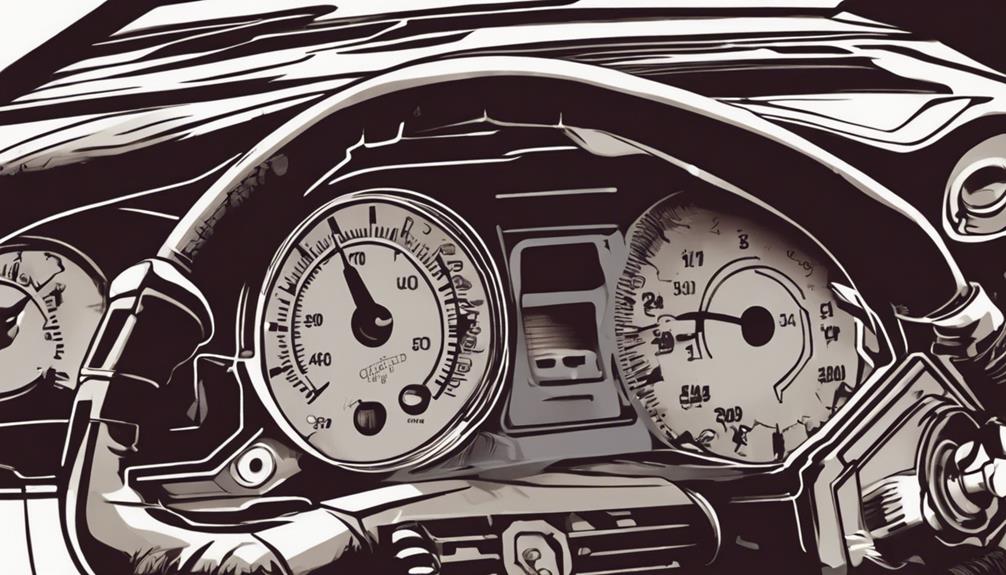
Transmission Troubles may manifest through various warning signs, including a blinking check engine light, which signals potential issues with critical components like the transmission fluid level or quality. When facing transmission problems indicated by a blinking check engine light, it's essential to address them promptly to prevent further damage.
Here are some key points to consider:
- Transmission Fluid Maintenance: Regularly checking and maintaining proper transmission fluid levels is crucial for optimal performance and longevity of your vehicle's transmission system.
- Fluid Contamination: Contaminated transmission fluid can lead to serious transmission issues, so it's vital to monitor fluid quality and address any signs of contamination promptly.
- Component Malfunctions: Problems with specific transmission components such as the solenoid, torque converter, or clutch can trigger the check engine light, requiring immediate attention to prevent extensive damage.
- Safety Concerns: Ignoring transmission troubles can result in improper gear shifting, compromising safety and vehicle performance, underscoring the importance of timely intervention.
Addressing transmission maintenance and fluid contamination issues promptly can help avoid costly repairs and ensure smooth operation of your vehicle.
Vacuum Leak
Experiencing a blinking check engine light may indicate a potential vacuum leak, causing an imbalance in the air-to-fuel ratio. When faced with this issue, prompt action is crucial to prevent further complications. Common signs such as rough idling, poor acceleration, and decreased fuel efficiency may be indicative of a vacuum leak. Addressing vacuum leaks promptly is essential as they can lead to engine misfires, rough running, and potential damage to engine components.
Vacuum Leak Information Table
| Common Signs of Vacuum Leak | Consequences of Ignoring | Recommended Action |
|---|---|---|
| Rough idling | Engine misfires | Professional diagnosis |
| Poor acceleration | Rough running | Timely repair |
| Decrease in fuel efficiency | Engine component damage | Preventive maintenance |
To diagnose and prevent vacuum leaks effectively, seeking professional help is advisable. Remember, taking care of vacuum leaks promptly can save you from costly repairs and keep your engine running smoothly.
Overheating Engine

Addressing an overheating engine promptly is crucial to prevent potential damage to vital components that can trigger a blinking check engine light. When dealing with an overheating engine, consider the following to ensure optimal performance:
- Preventive Maintenance: Regularly check and maintain your cooling system to prevent overheating issues. Neglecting this can lead to costly repairs and inconvenience.
- Cooling System Maintenance: Keep an eye on your coolant levels and ensure they're at the recommended levels. Proper coolant circulation is essential for managing engine temperature.
- Immediate Action: If you notice your engine overheating, pull over safely, turn off the engine, and allow it to cool down. Ignoring this warning sign could result in severe engine damage.
- Professional Inspection: If the overheating persists or if you see a blinking check engine light, seek professional help immediately. A trained technician can diagnose the issue accurately and prevent further complications.
Taking proactive steps in maintaining your cooling system can prevent an overheating engine and subsequent blinking check engine light, ensuring your vehicle runs smoothly.
Fuel System Malfunction
To diagnose a fuel system malfunction accurately, consider consulting a trained technician promptly. Fuel injector problems can cause the check engine light to blink.
Regular fuel system maintenance, like using quality fuel and additives, can prevent issues. If you suspect a fuel injector problem, have it inspected by a professional to avoid engine damage and poor performance.
Fuel pump failure can also trigger the check engine light. Troubleshooting a faulty fuel pump involves checking the fuel pressure, electrical connections, and fuel filters. Timely detection and repair of fuel pump issues are crucial to prevent breakdowns and costly repairs.
Electrical System Fault
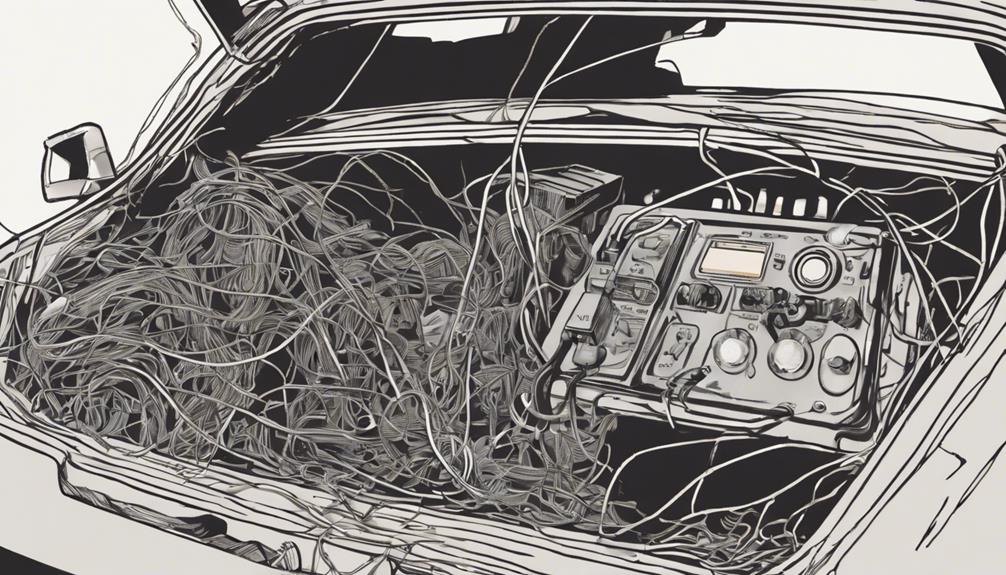
If your check engine light is blinking, a potential cause could be an electrical system fault, which may involve issues like a malfunctioning ignition coil or damaged wiring. Ignoring these electrical system problems can lead to engine misfires, decreased fuel efficiency, and even damage to other vehicle components.
Here are four crucial points to consider:
- Alternator failure and battery issues can disrupt the power supply to essential vehicle systems, affecting performance and reliability.
- Wiring problems can cause shorts or open circuits, leading to erratic behavior in sensors and other electronic components.
- Sensor failure due to electrical issues can result in inaccurate data being sent to the engine control unit, impacting overall vehicle operation.
- Neglecting prompt attention to electrical system faults signaled by a blinking check engine light can result in costly repairs and compromise the safety and efficiency of your vehicle. Addressing these issues promptly with professional diagnosis and repair is key to maintaining your vehicle's health and performance.
Frequently Asked Questions
What Is the Most Common Cause of Flashing Check Engine Light?
When your check engine light flashes, the most common culprit is ignition system problems or fuel mixture imbalances. Ignoring these issues risks engine damage. Addressing them promptly prevents costly repairs and keeps you safe on the road.
Is It OK to Drive With Flashing Check Engine Light?
You should never drive with a flashing check engine light. It's crucial for safe driving and proper engine diagnostics to address this issue immediately. Ignoring it can lead to severe damage. Seek professional help promptly.
Will Bad Spark Plugs Cause Check Engine Light to Blink?
When bad spark plugs cause your check engine light to blink, it's like your car's way of saying, "Hey, pay attention!" Ignition misfires mess with your fuel mixture, risking engine damage. Don't ignore it—replace those spark plugs for optimal performance and efficiency.
Will a Bad Oxygen Sensor Cause a Flashing Check Engine Light?
If your check engine light is flashing, a faulty oxygen sensor could be to blame. Ignoring it risks engine damage and inefficiency. Get diagnostics from a pro and replace the sensor promptly to restore performance.
Conclusion
So, there you have it – 10 fantastic reasons for your check engine light to start blinking like a disco ball.
Remember, ignoring these warnings is like playing Russian roulette with your engine. Don't be a daredevil, get those issues sorted out before your car turns into a fiery mess on wheels.
Stay safe, stay smart, and keep that engine purring like a contented kitten.

